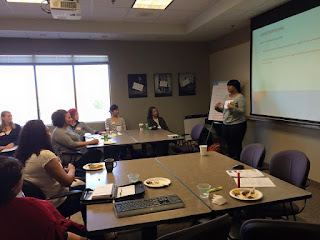On May 19th, LOCUS held an event on code-switching called "Intersectionality with Intentionality." We started the event with delicious food from Chelle’s Kitchen and the ice breaker “Who are you?” allowing people to get to know each other and reflect on ways they identify themselves. After the icebreaker, Diane and Rashanda started their presentation by screening Key and Peele’s “Phone Call” video which prompted much laughter among the participants. In response, an attendee noted that in their experience, people tend to switch their tones and attitudes when they are around people we personally identify with. On the same topic, another attendee noted that this may occur because we project what we think we're supposed to be behaving like.
Afterwards, the group started discussing the positive and negative aspects of code-switching. Some positives of being able to code-switch were identified as flexibility, credibility, empathy, and understanding. On the other hand, some negatives of code-switching were identified as inauthenticity, threat to credibility, and difficulty being one’s whole self. After discussing the multifacetedness of code-switching, the participants began to address ways that we can become comfortable with code-switching. Some said that it requires caring less about what others think about you. Some said that friends and family can help you become comfortable, which also led to a discussion about how witnessing your loved ones code-switch can be a challenge or advantage to deciphering the authenticity of others.
Diane and Rashanda then dove into the framework of kyriarchy, a term coined by Elisabeth Schussler Fiorenza in 2001 and described as a “complex pyramidal system of intersecting multiplicative social structures of superordination and subordination, of ruling and oppression.” This concept really helped the participants better understand the complexity of our identities, as author, Sian Ferguson, describes how kyriarchy builds on intersectional feminism:
1. It acknowledges that gender-based oppression is not the only type of oppression that exists.
2. It acknowledges that one can both benefit from and be oppressed by the system.
3. It could suggest why so many oppressed people are complicit in their own oppression.
4. It does not erase people who do not identify as men or women.
5. It acknowledges that oppressions are interlinked.
In order to reflect on our individual experiences within the kyriarchy framework, the participants engaged in an activity where we had to place ourselves on the kyriarchy diagram. The activity brought up an interesting discussion about how these labels can have different meanings within various cultures or individual perspectives and how that can influence someone to choose their place within the diagram. For example, someone might be labeled having “light” skin in their community; however, within the context of the diagram they might be labeled having “dark” skin.
At the end of the event, everyone was asked to identify one aspect of the discussions they would take away from the event. People said they would take away:
- the more positive aspects of code-switching
- the value in having multiple identities
- language around describing code-switching
- different ways to share the content with others
- the significance of having self-awareness
- better understanding of feminism/kyriarchy
- more questions about the topic
- a sense of struggle because privilege is a part of oneself that’s difficult to identify with
- the welcoming nature of the LOCUS space
- the perspective that it can be a privilege to have the agency to code-switch
- gratitude of having knowledge around code-switching
When asked for one question that the participants still had, they said:
- How do I use my systemic privileges to benefit the oppressed?
- How can I bring more of those identities to spaces at work?
- When do you decide to take the risk not to switch, to really show up?
- How can I be more mindful about helping others to be more mindful?
- How can I understand when I'm code-switching and when I don't need to be doing it?
- How do I share this information with other people and not shame them?
- How can I be a better ally?
- How do talk to people about the nuances or fluidity of identities?
- Where are the men in the room?
- How do we create the space for code-switching to be an asset?
- In what ways can I not only challenge the system but also challenge the arbitrary middle ground?
- As a privileged person, what space am I welcome in?
- When is it appropriate to push back?
- What level of conflict is okay, to bring up people's voices who are not at the table?
- What do you call someone who fights this [system]?
- How do you spread this information about this?
- How do you bring this conversation to spaces of privilege?
- What is the intention behind code-switching?
- Does this work as a baseline for understanding these oppressions?
- How do we push this conversation to a next level?
Thank you everyone for such a lively and insightful discussion. We look forward to having more in the near future!


